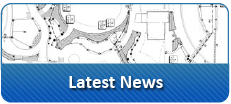What Does LEED and SITES Mean for Sustainable Irrigation?
Landscape professionals have a major role to play. Among other things, sustainable irrigation can help protect habitat, contribute to storm water management, reduce fossil fuel usage and conserve water. Across the country, green industry providers are lending their efforts in countless ways. Green roofs and walls, rainwater catchment systems, rain gardens, native plantings and no-mow zones are just a few examples. The professionals at Landtech are following suit by shifting the way we think about the future of irrigation. Programs like LEED and SITES have created a whole new way of thinking for us. We have witnessed firsthand how those with expertise in sustainable irrigation can provide high value perspective to developers, landscape architects, engineers and homeowners. Irrigation consultants are playing a valuable role in bettering the environment while at the same time boosting the image of the entire industry. While many in the irrigation industry see the rising trend of construction projects forgoing or minimizing irrigation to gain LEED and SITE credits as a threat, we are looking at this as an opportunity to engage. Efforts to conserve are not a passing fad. As irrigation professionals, we see that we have an important role to play as leaders in this movement. At first touch, LEED and SITE credits seem like a threat to our bottom line. However, the reality is that water is a scarce resource and we, as irrigation professionals, possess front-line knowledge and experience that give us an edge in providing value to the growth of the conservancy movement. LEED projects require a different mindset, and we know the platform of products that effectively accomplish water conservation. We know what will work best for the specific needs of a project. Addressing irrigation from a design/build approach is usually not effective because irrigation contractors often don’t know what products to use to get LEED or SITE credits. At Landtech, we know exactly what needs to be done to meet the calculations for those water-efficiency credits. As experts in irrigation and devout followers of state-of-the-art technology, we create the right roadmap to get the results that are in demand in this era of green development. ...
Read More7 Reasons to Use an Irrigation Consultant
For many new construction projects in the Midwest and Northeast, irrigation is typically viewed as an overlap of landscaping and therefore usually does not have a well defined plan. Without having a set plan that multiple contractors can use to base their price quotes on, the construction manager gets prices that are based on the individual contractor’s cheapest version of the plan, so the construction manager is not comparing apples-to-apples and is not getting the best irrigation system for the job. With this approach, the construction manager is basing their decision off of who has the lowest bid, not who has the best plan that will meet the long term needs of their clients. This is why hiring an irrigation consultant may be one of the smartest investments a building manager makes in the overall design/build process. Here are seven reasons to use an irrigation consultant: 1. Commercial irrigation systems have become expensive; irrigation technology is sophisticated and can often be confusing. An irrigation consultant is a specialist who is kept up-to-date (by manufacturers), and can design a long-lasting system that is both water and energy efficient. 2. Most consultants are willing to review products with you, and can help you select from a wide array of products on the market. They can help you separate facts from confusing sales claims. 3. Most importantly, an irrigation consultant can be supportive in the struggle to convince your client (and/or construction manager) to not sacrifice quality, by value-engineering, and substituting-out the most appropriate products that will be long-lasting & efficient, and (when applicable) will enable the project to meet the requirements of LEED and/or SITES. 4. A consultant puts contractors and distributors on an equal footing by impartially specifying the appropriate equipment for the project being addressed. The bids that are submitted will also be more comparable, allowing the decision-makers to compare apples-to-apples. 5. A consultant is aware of project considerations beyond equipment selection: water/power supplies and consumption, location of upfront equipment (backflow preventer, pump-station, mechanical room spatial requirements) plant watering needs, environmental concerns, etc. 6. A consultant can assist the landscape architect/developer in developing accurate budget estimates. 7. An increasingly common involvement is that of water-harvesting. An irrigation consultant provides a crucial link with the team in being able to provide early preliminary calculations for anticipated water use/demand. This greatly assists in the planning efforts in the programming phase of a project, in determining water-storage chamber sizes & location, and positioning of the necessary mechanical equipment involved. If you would like to learn more, contact Jim Davis at 314-541-2779 or email him...
Read MoreWhy Use An Irrigation Consultant For Your Project?
If your client is considering having an irrigation system installed on a project, hiring an irrigation consultant can be vital to the process. A few points that you should be aware of are: 1) Good, long-lasting irrigation systems can be expensive. 2) An irrigation system is basically a utility, which is costly to modify after being installed. 3) Irrigation controller technology is both sophisticated and ever-changing. Why not just release a ‘performance spec’ and go about it from a design-build approach? This usually results in distributors designing against each other with ‘competitive pricing’ as the dominant influencer. The project manager may not realize that they could be handicapping themselves (and their client) in their quest for a good, quality system by taking this route. First, whenever a sale is an uncertainty, one of the contractors’ biggest concerns will be cost control of their design efforts. Potential site problems, which may deserve careful field review and analysis, will likely be handled on an ‘assumption’ basis. And, quotations/bid forms will usually be written so that incorrect assumptions will revert back to the client/developer or general contractor. Second, the contractor’s next biggest concern will be cost of the system’s components. Competing contractors/distributors will usually not suggest the latest, state-of-the-art products to the prospective customer because they will be worried that their competition will undercut them and win the bid. This is true with whole-good products (sprinklers, drip, valves and controllers), and especially true with ‘allied’ components of the system (pipe, wire, fittings, gate valves). The premium products that can create an efficient and sustainable system (using water-saving products) just won’t make it onto the project. Even on a non-LEED project, the system could be ‘WaterSmart’ if a Certified Irrigation Designer (consultant) is involved on the project from the very beginning. If the client and/or design team is interested in having an irrigation system that incorporates some of the newer, state-of-the-art products that conserve water and create a high-efficiency system, then the team should consider hiring a professional irrigation consultant for the project. (Not many contractors have the Irrigation Association’s ‘Certified Irrigation Designer’ certification.) The sole aim of an irrigation consultant is to design an efficient/productive system that will fulfill the project’s needs for the long term. They are not in the business to sell sprinklers, nor are they concerned with the ‘market share’ of manufacturers. Measured against the initial cost of a new system, the money spent for irrigation consulting services may well turn out to be the wisest investment in the overall design/construction process, and a good guarantee that the new system will work for the long term. The irrigation design and consulting fees on commercial projects may range from $1500-$20,000; however, most probably average between $2-4000 per project. On a well-designed system, typical operational savings might be around $2000 per season ($1000 from reduced water-use, and $1000 from fewer service/repair calls). That common scenario illustrates a payback-period of as little as two-years for the services of a Certified Irrigation Designer. If you would like to learn more, contact Jim Davis at 314-541-2779 or email him...
Read MoreET Water: Innovative, Efficient Irrigation
Landtech is committed to finding the most efficient and innovative methods for reducing water use in irrigation. ETwater™ Intelligent Water Management, the world’s most advanced and efficient irrigation water system, reduces water use by 20%-50% while assuring plants stay healthy. ETwater’s self-adjusting irrigation control system combines state-of-the-art horticultural science and proprietary web-based technology to automate the scheduling of sprinkler drip irrigation. Water is applied to landscapes based on current weather conditions and specific landscape factors, including plant type, soil type, slope, sun/shade, sprinkler type, and distribution uniformity. The ETwater central server communicates daily with the on-site controller to automate scheduling. The ETwater central server tailors the schedule to the user’s landscape profile and the current weather conditions. How it Works: The customer enters his/her landscape profile online and downloads it to ETwater ’s server. This step may be performed by the landscaper when irrigation system is installed. A weather station in the customer’s community constantly measures climate details and rainfall. We access the real-time weather information for the customer’s local area and match it with his/her landscape profile to develop the ideal watering schedule. Our server interfaces daily with the customer’s on-site ETwater Smart Controller to update the customized watering schedule based on ET and rainfall. The Smart Controller ensures that each zone is watered correctly according to the customer’s landscape profile. ETwater was the first product to successfully complete the rigorous industry standard Smart Water Application Technology (SWAT) test in November 2004, 15 months before any other smart controller product. ETwater is the only irrigation product ever to win the coveted Wall Street Journal Tech Award for “Best Environmental Technology Innovation,” receiving the award in September 2006....
Read MoreLandech to Design Irrigation System for Kingdom Tower, Soon to be the World’s Tallest Building
Landtech Design is pleased to announce that it has been hired by Adrian Smith + Gordon Gill Architecture to be the landscape irrigation design consultant for the “Kingdom Tower” project in Jeddah, Saudi Arabia, soon to be the world’s tallest building. “We are honored to be a part of the talented team of designers on such a magnificent project,” says Landtech manager Jim Davis. “Our leadership and experience with highly-efficient irrigation practices was instrumental in positioning us on the project.” Expected to cost $1.2 billion to construct, Kingdom Tower will be a mixed-use building featuring a luxury hotel, office space, serviced apartments, luxury condominiums and the world’s highest observatory. The cost-efficient and highly constructible design of the building is forward-looking, taking advantage of new and innovative thinking about technology, building materials and energy conservation. Landtech will harness the latest innovations in sustainable irrigation technology to design the Kingdom Tower irrigation system. Water harvesting efforts will collect rainwater and condensate from the building to supply water for irrigating the grounds’ 8.5 acres of green space. The condensation will be collected as the building’s air conditioners extract water from the humid Red Sea air and directs it into a large cistern near the base of the building. The irrigation system will include technologies such as UV sanitization, a fertilizer injection system, ET/weather-based sensors, and a central control system that will allow the entire operation to be controlled remotely. At over 1,000 meters and a total construction area of 530,000 square meters (5.7 million square feet), Kingdom Tower will be the centerpiece and first construction phase of the Kingdom City development on a 5.3 million-square-meter site in north Jeddah. The tower’s height will be at least 173 meters (568 feet) taller than the world’s current tallest building, Dubai’s 828-meter-tall Burj Khalifa. Kingdom Tower – Schematic Landscape Design...
Read More


